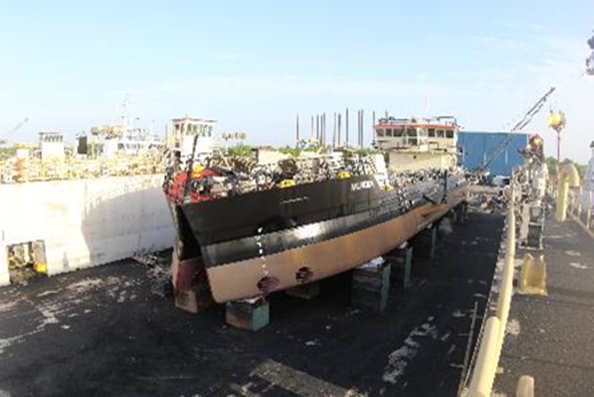Q: Please provide a brief career background.
A: I came up as a teenager and young adult in a vertically integrated seafood business
(catching and processing primarily shrimp, tuna, & swordfish), which was initiated by my father, Robert
Thomassie. I pulled my first marine gear at the age of 15, and performed all types of maintenance, repair,
design and construction in both our fishing fleet and our processing plant. As operators of a small family
business, my brothers and I grew up performing various duties as the business grew (i.e., basic diesel
mechanics, fabrication and welding, electrical installations and troubleshooting, commercial refrigeration,
digging ditches, shoveling shrimp, outside machinist, etc). You name it, we did it with our own hands.
My father has a passion for all things marine, and we built several of our own fishing vessels (launching
them with wedges, hammers, and a lot of sweat), as well as offshore towing vessels my father operated
separately through the late 70’s and 80’s. He eventually started our proper shipyard operations in 1990,
reviving a defunct waterfront fabrication facility in Houma, LA. I became involved in shipyard operations full
time in 2002, starting from the ground up, and have been a Managing Director of our shipyard operations since
my father’s retirement in 2010.
Being involved in a hands-on family business, I have gained over 23 years of experience in shipbuilding, cost
estimating, operations management and vessel design in the marine vessel construction and repair industry. I
believe many of the lessons learned in the trenches with my team have proven invaluable in navigating the
management of our business and the associated projects, many of which are complex, high value endeavors for
sophisticated clients. Over the years, I have been fortunate to participate in and watch the growth of the
individuals I am surrounded with at our company, and I am proud of their abilities and accomplishments – we
truly have a team that punches above their weight class.
Q: Please provide a ‘By the Numbers’ look at your shipyard today.
A: Thoma-Sea has grown over the years with a proven ability to design, manage, and execute
complex commercial marine and government vessel construction projects from concept through delivery. We have
built an excellent team, managing a work force of 500+ employees, delivering many vessels of various sizes and
mission requirements ranging up to 330-ft. in length and 10,000LT of displacement.
Thoma-Sea’s experience in the construction and repair of marine vessels covers a variety of vessel types and
sizes, including but not limited to: Offshore Supply Vessels, Well Stimulation Vessels, Hydrographic Research
Vessels, Inland Tugs, Offshore Tugs and Anchor Handling Vessels, Ferries, Complex Trawler/ Processors,
Specialty Vessels, and Barges for both commercial and government clients. We have built some of the most
complex commercial vessels, including a cutting edge 100m Trawler/Processing vessel for the pollock fishery,
Last Generation Well Stimulation vessels, and Seismic Research vessels.
Thoma-Sea is a small/medium shipbuilding and repair company consisting of three shipyard locations, (2x New
Construction, 1x Repair/ Conversion) covering over 100 combined acres of waterfront property. TMC facilities
provide covered fabrication shops at each location, a full steel processing center (Blast, Paint, CNC cutting,
NC forming, Frame Bending, etc.), an ABS Certified Machine Shop, and a Pipe Spooling Shop with NC bending and
CNC profiling capabilities. TMC repair operates four floating dry docks ranging in capacity from 3500T to
10,800T, the largest of which has a well for servicing drop down thrusters.
Q: Looking ahead, what are some key challenges or opportunities you foresee for the maritime industry in the next 5-10 years?
A: Some key challenges and opportunities for the maritime industry in the next 5-10 years include the need for continued innovation in vessel design and technology to improve efficiency and environmental sustainability. The industry will also need to adapt to changing regulations and requirements, such as emissions standards and safety regulations. Additionally, there is a growing focus on digitalization and automation in the maritime industry, which presents both challenges and opportunities for shipyards and vessel operators.
On the opportunity side, there is a potential for growth in the offshore wind industry, which will require specialized vessels for installation and maintenance. The push towards renewable energy sources could also create opportunities for shipyards to diversify their portfolios and build vessels for the green energy sector. Collaboration between industry stakeholders, government agencies, and research institutions will be key to addressing these challenges and seizing these opportunities in the coming years.
Overall, TMC has a demonstrated track record of success in the shipbuilding industry, with a strong production capability and a history of delivering high-quality vessels. The current focus on shipbuilding and the Marine Industrial Base from the Trump administration is seen as a positive development, although the full impact of these initiatives remains to be seen. As the industry looks towards the future, challenges and opportunities abound, and it will be important for shipyards like TMC to continue to innovate and adapt to changing market conditions in order to thrive in the years to come.

